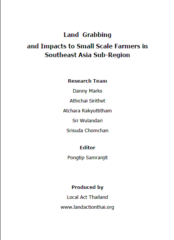
This paper is part of a research on Land Grabbing in Southeast Asia Sub-Region conducted by Local Action Links (Local Act, Thailand). It aims to study the situation of land grabbing and its impacts on small-scale farmers in 5 countries, namely Thailand, Myanmar, Laos, Cambodia and Vietnam. This paper presents the first draft report of the study on cases of land grabbing in Thailand, Myanmar, and Cambodia.
One of the biggest problems in the Southeast Asia Sub-Region countries is land grabbing. For the purposes of this paper, land grabbing is defined as a large-scale acquisition (normally 200 hectares or more) by a corporate investors or government entities through buying, leasing or accessing land in order to produce food or non-food crops or to use this land for extractive purposes, such as hydropower dams and logging. They make these acquisitions for the purpose of increasing supply of goods for domestic and foreign markets or making a favorable return on an investment. The FAO’s definition of land grabbing adds that these acquisitions undermine food security in the host countries.

Rejoignez-nous sur
LinkedIn